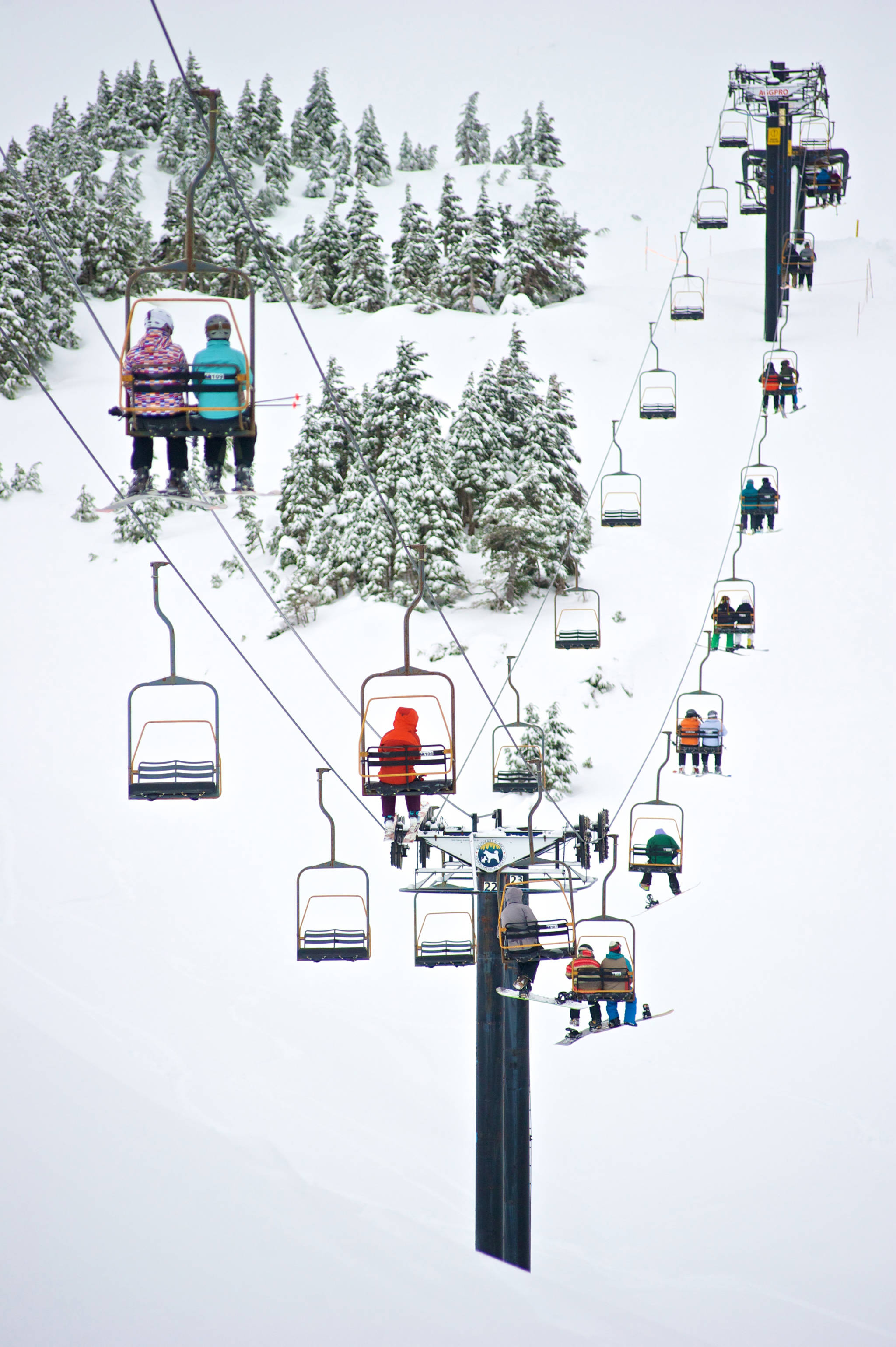On Sunday morning, a rogue squirrel shut down a large portion of Eaglecrest Ski Area.
The wandering squirrel had the poor fortune of coming in contact both with an energized piece of electrical equipment and a grounded piece of equipment at the same time and got electrocuted, Alaska Electric Light &Power vice president and director of consumer affairs Debbie Driscoll said. That electrical surge resulted in a power outage that affected Douglas and parts of downtown, but it also had a major effect on Eaglecrest.
Three of Eaglecrest’s four chairlifts — the Hooter, Porcupine and Ptarmigan chairs — run on AEL&P power, and when the power stopped, so did they. Eaglecrest Interim Manager Nate Abbott estimated that around 200 people were on the chairlifts when power went out. In addition, the Porcupine Lodge also lost power.
“When you lose power to three lifts and your base lodge,” Abbott said, “things kind of get a little crazy.”
That craziness didn’t last long, as the power went out at 10:58 a.m. Sunday and the chairlifts were all cleared by 11:43 a.m. with normal operation resuming at 11:50 a.m. Issues continued with the network for a while after, which impeded ticket sales and other minor issues until about 12:30 p.m., Abbott said.
There were no injuries and most of the patrons who were stuck on the chairlifts weren’t too upset. Bonnie Carothers, an accountant for the state, was there with her 3-year-old son John Jensen and was aboard the Porcupine lift when power went out. Jensen, who likes riding the lift on his own, was alone on the chair behind Carothers. Carothers looked back at her son and saw he was upset.
“He was crying,” Carothers said, “but not because he was scared. He just wanted to go skiing and the chair wasn’t moving.”
Carothers said she would have been more upset if the weather were worse, but it was sunny and warm Sunday. Not even Jensen was shaken, as the toddler was first in line when the lift began functioning again. Carothers was also back on the slopes immediately, and returned to them Monday for nearly six hours.
The Black Bear lift is the only lift that runs on a diesel generator, as Eaglecrest has been transitioning to using AEL&P power the past few years. Starting in 2009, Eaglecrest has been switching over its power from on-site power generation to using AEL&P power, and this is the first time Abbott can remember there being an outage during business hours.
Abbott said getting backup power to all of Eaglecrest’s lifts would be a challenge.
“Right now, our backup power generation, there’s just no physical way to get that power to the lifts,” Abbott said. “We don’t have enough capacity, but we’re looking in the future to actually have it so that if AEL&P goes down for some reason, that we could actually power our lifts with our own generation. But that’s a ways down the road and would cost a fair amount of money, one of those pie-in-the-sky type dreams.”
Eaglecrest has been transferring its chairlifts over to electric power and away from relying on on-site diesel energy for two main reasons, Abbott said. First of all, getting away from diesel generators cuts down on noise pollution, making for a better environment and easier communication. Secondly, there’s a great deal of maintenance required for diesel generators, and not much with electricity.
The other lifts have auxiliary power units (APUs) that Eaglecrest tests regularly, and they all worked to get the lifts slowly moving and get patrons off. These APUs are required to move the lift at 100 feet per minute, Abbott said, though most of Eaglecrest’s are a little faster than that.
Ptarmigan’s backup motor is the easiest to operate, Abbott said, and the clearing of that lift started within 10 minutes and was cleared at 11:24 a.m. Ptarmigan is also the longest lift and has the most people on it at any given time, so that was the top priority.
Evacuating the Hooter lift was a bit more difficult, Abbott said, as there was an electrical issue that required troubleshooting. Still, it took just 11 minutes to clear that lift.
Porcupine was the final lift evacuated, as it’s the shortest and it’s the closest to the ground, Abbott explained. It’s also nearest to the lodge, so communication to that lift is easier. Employees went out to each lift and explained to stranded patrons what the situation was, and talking to those on the Porcupine lift such as Carothers and Jensen was the most convenient.
Almost everything went as planned, Abbott said, though he acknowledged that it’s not ideal that people were stranded for any amount of time.
“I think ultimately, I think we performed fairly well,” Abbott said, “even though from the outside it might not have looked like that at times.”
• Contact reporter Alex McCarthy at alex.mccarthy@juneauempire.com or 523-2271.

